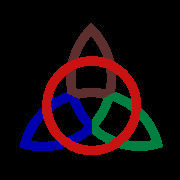
| Geography |
Maps
|


|
Page Bar
|
|
|
Pg.1
|
|
|
Pg.2
|
|
|
Pg.3
|
|
519 AD - 1800 AD
After the revolution the people throughout Triquatra were happier and found that the changes that they had decided on were working very well and allowing them to feel and be treated with respect and freedom they so longed for. But they still had no social or cultural values in their lives. As a result of this the government decided on building these values by building cathedrals and shrines for their gods, their religion had slightly changed from that of Roman Religion over the years due to geography, their hate towards Roman Rule and the fact that they were cut of from Rome for all these years. Also the entertainment grew as a result of building amphitheaters, theatres and even a Hippodrome. The government also felt that all of the people of Triquatra should be educated and built schools and libraries, those that were able to read and write were forced to work in these educating the population.
At the start of the next millennium (1000 AD) Triquatra had developed very well and now had a population of approximately ninety thousand to one hundred thousand. Most of the knowledge gained by Rome in the ancient times still existed and was even expanded on. There was very little interaction with rest of the world except for isolated incidents where explorers from either other countries or Triquatra itself set off on journeys of discovery.
On one of these journeys, Captain Ponta Delgada, discovered what is now known as the Azores Islands. He discovered the islands in 1060 AD and claimed them as Triquatrian land. Triquatra maintained these islands but did not depend on them as their own island supported them extensively. They took resources from the islands and brought them back to Triquatra, for instance some species of plants and animals. The total population to enter the island was only about four thousand people, as the government found no use for it.
Triquatra's only real threat came in 1431 when Portuguese explorer Gonzalo Cabral invaded the Azores islands. Portugal saw thought that there were no real inhabitants of these islands claiming them for themselves. Triquatra believed that these were their islands, but were by no means in a position to defend the islands and could only save their own. The Portuguese, really allowing Triquatra to remain unaffected, began trade with Triquatra realising the vast amount of materials and minerals that Triquatra had. Triquatra had a range of different resources and really didn't intend to trade resources with them but instead found it more beneficial to trade technology, advancing not only their technology but also the Portuguese.
.
Triquatra also learned many things from the Portuguese but their main interest was the world around them and how it operated. They learned about science most of all and were fascinated by what they were told. They repaid the favor by teaching the Portuguese more advanced ways of farming, mining and using the land around them with the use of machines that the Portuguese did not know of.

